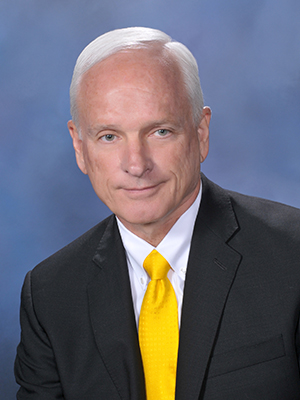
Dr. Dallas Little received his doctoral degree from Texas A&M University in 1979. Now 40 years later, he has been awarded the highest faculty honor by the university he has served so well.
Little, Regents Professor and E.B. Snead Chair Professor of Transportation in the Zachary Department of Civil and Environmental Engineering, has been named a Texas A&M Distinguished Professor.
The title identifies faculty members who are preeminent in their fields and exemplified by outstanding teaching, mentoring, discovery and service.
"I feel very humble and very honored for such a wonderful recognition. When you get something of this magnitude, you question whether or not you deserve it, and I feel that way right now," Little said. "A number of things brought this to be, and one was having a great faculty mentor when I was getting my Ph.D. here, Dr. Jon Epps. He is a recognized leader in our industry and gave me a tremendous start. I owe a lot to him.
"I'm also fortunate to have a position here on the faculty in a department where we are provided with such an accommodating and supportive environment for research and learning. I learn every single day,” he said. “It's a joy to be able to apply the principles of physics and chemistry to help solve problems for an industry with such a profound impact on our nation’s transportation systems."
Little, referred to as the “father of chemo-mechanics” by some of his colleagues, is a recognized international leader for his work on predictive performance modeling and design of structural pavement systems, characterization and modeling of damage and healing mechanisms in asphalt paving composites and chemical soil stabilization.
“When one considers the significant, influential contributions Dr. Little has made to the development and improvement of millions of miles of highways, airports and other paved surfaces around the world, very few individuals can claim his impact,” said Dr. Robin Autenrieth, head of the civil engineering department.
During his distinguished career, Little has been making critical contributions to the transportation industry. He applied the principles of chemo-mechanical processes to micro-damage and micro-damage healing in asphalt and concrete composites that comprise the majority of multi-trillion-dollar pavement infrastructure. His work on micro-damage healing began a revolution in the way the damage process is considered in asphalt pavement structures.
Little said his breakthroughs in chemical stabilization of soils and the extended model for the way pavements perform are two of his pride points.
Little's pioneering contributions are followed by researchers globally, taught in undergraduate and graduate courses, and adopted in professional design and analysis manuals.
Little is the primary author with two other co-authors of an 800-plus-page textbook released in 2017 and has more than 230 refereed journal publications, contributed to five books and given 420 invited lectures and 40 keynotes and plenary presentations.